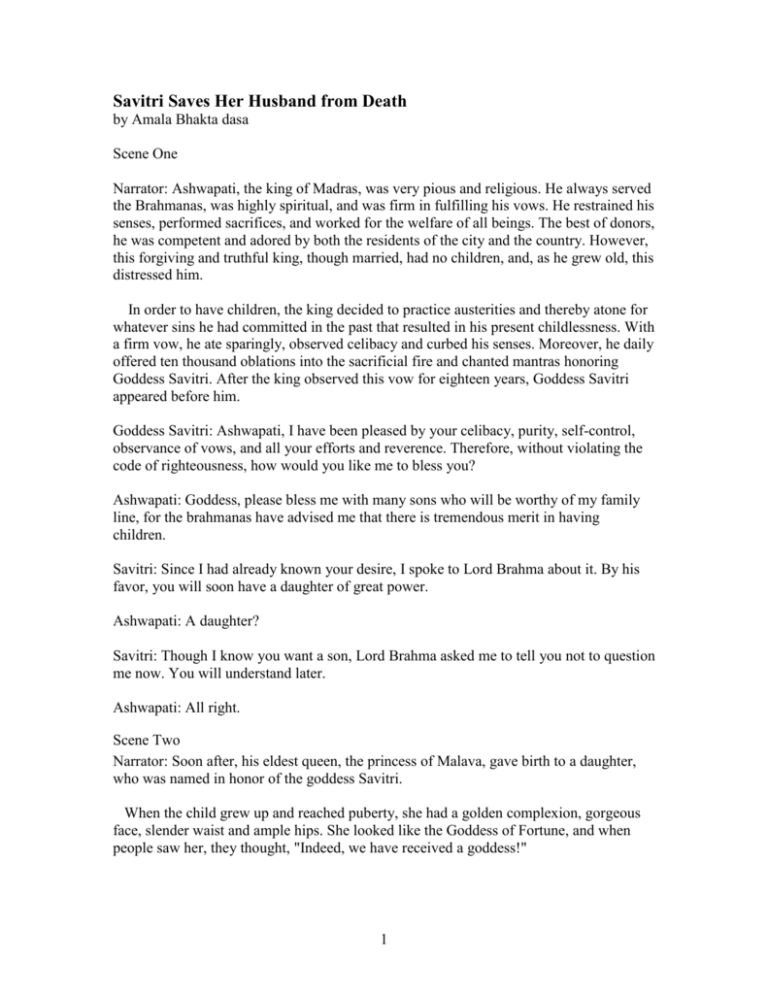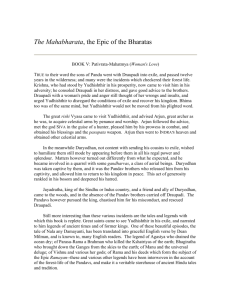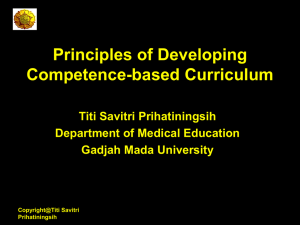2Savitri Saves Her Husband
advertisement

Savitri Saves Her Husband from Death by Amala Bhakta dasa Scene One Narrator: Ashwapati, the king of Madras, was very pious and religious. He always served the Brahmanas, was highly spiritual, and was firm in fulfilling his vows. He restrained his senses, performed sacrifices, and worked for the welfare of all beings. The best of donors, he was competent and adored by both the residents of the city and the country. However, this forgiving and truthful king, though married, had no children, and, as he grew old, this distressed him. In order to have children, the king decided to practice austerities and thereby atone for whatever sins he had committed in the past that resulted in his present childlessness. With a firm vow, he ate sparingly, observed celibacy and curbed his senses. Moreover, he daily offered ten thousand oblations into the sacrificial fire and chanted mantras honoring Goddess Savitri. After the king observed this vow for eighteen years, Goddess Savitri appeared before him. Goddess Savitri: Ashwapati, I have been pleased by your celibacy, purity, self-control, observance of vows, and all your efforts and reverence. Therefore, without violating the code of righteousness, how would you like me to bless you? Ashwapati: Goddess, please bless me with many sons who will be worthy of my family line, for the brahmanas have advised me that there is tremendous merit in having children. Savitri: Since I had already known your desire, I spoke to Lord Brahma about it. By his favor, you will soon have a daughter of great power. Ashwapati: A daughter? Savitri: Though I know you want a son, Lord Brahma asked me to tell you not to question me now. You will understand later. Ashwapati: All right. Scene Two Narrator: Soon after, his eldest queen, the princess of Malava, gave birth to a daughter, who was named in honor of the goddess Savitri. When the child grew up and reached puberty, she had a golden complexion, gorgeous face, slender waist and ample hips. She looked like the Goddess of Fortune, and when people saw her, they thought, "Indeed, we have received a goddess!" 1 The king was very fond of her; Savitri grew up as a beautiful girl and became the darling of the entire kingdom. She became an expert in all the games in which boys normally excel. She was intelligent, courageous and had been given by her parents full freedom to shape her own career. Her spiritual splendor, force, and beauty were so overwhelming that possible suitors, feeling unequal to and inadequate for her, refused to ask her to marry them. Ashwapati: My daughter, Savitri, it is now time for you to get married but no man has asked to marry you. Therefore, it would be best for you to yourself to look for a husband. His qualities, of course, should be equal to yours. Choose a man that you feel strongly towards. When you find him, let me know. If, after consideration, I think he is suitable, I will surely give him to you. The Brahmanas say that the father who does not get his daughter married will be disgraced. But remember: when you look for a husband, act in such a way that the gods will not disapprove. (She leaves.) Scene Three (Ashwapati is conversing with Srila Narada Muni when Savitri approaches them respectfully.) Narada Muni: O King, where did your daughter go? Where is she coming from? She is now marriageable, so why don't you obtain a husband for her? Ashwapati: That was the reason that I sent her away - to find a spouse. (to Savitri) Now, my dear, tell me about the man you have chosen. Savitri: There was a righteous king among the Shalwa people named Dyumatsena but after some time, he went blind. Then, one of his enemies took away his kingdom, forcing that king, along with his wife and only child, to live in the forest. That son is now a young man worthy of becoming my husband. I have taken him to my heart as my Lord. Narada Muni: That's too bad. Savitri has made a wrong choice. Ashwapati: Wrong? Narada Muni: Yes, the youth she is referring to is Satyavan and he does have exceptional qualities. Both his father and mother are always truthful; that is why the brahmanas call him Satyavan. Ashwapati: And, he is energetic, intelligent, forgiving and courageous? Narada Muni: His energy is like the Sun's, his wisdom like Brhaspati, his courage like that of the king of the gods and his forgiveness like the Earth's. 2 Ashwapati: But, is he generous in gift-giving and devoted to the Brahmanas? And is he handsome, unselfish and stunning to look at? Narada Muni: In gift-giving, he is like King Rantideva, who fed innumerable beggars. In truthfulness and devotion to the Brahmanas, he resembles King Shibi, who offered his own body as a sacrifice to protect a pigeon from a hawk. In unselfishness, he is like King Yayati, in handsomeness like the Moon and in physique like the stunning Ashwins. He restrains his senses and is humble, courageous and truthful. With controlled passion, he is dedicated to his friends, devoid of hatred, unassuming and forbearing. Indeed, great sages say that his behavior is always proper and his honor firmly established. Ashwapati: Those are his good qualities, but what about his flaws? Does he have many? Narada Muni: He has only one flaw and it overpowers all his virtues. Ashwapati: And, what is that? Narada Muni: It is this: In one year from today - Satvavan will die! Ashwapati: Well, my daughter, you heard what the sage said. It will best for you to choose a different man. Savitri: Death can only come once. A daughter can only be given away once. And a person can only say once, "I give this away." Similarly, whether Satyavan's life is short or long, virtuous or evil, I’ll only choose my husband once and I have done so! Narada Muni: King, your daughter's mind is firm. It is not possible to dissuade her from this virtuous course. As no else has Satyavan's virtues, I approve of this marriage. Ashwapati: I will do as you say, for you are my teacher. Narada Muni: May Savitri's marriage be peaceful and may you all be blessed. Farewell. (Narada Muni leaves.) Scene Three - The Ashram of Dyumatsena (Dyumatsena greets Ashwapati and Savitri respectfully and offers them seats and refreshments.) Dyumatsena: O King, what is the purpose of your visit? Ashwapati: Dyumatsena, this is my lovely daughter, Savitri. I would like you to accept her as your daughter-in-law. 3 Dyumatsena: But, we have been dispossessed of our kingdom; that is why we are living here! Our lives consist of practicing asceticism to acquire virtue. How will your noble daughter, Savitri, bear the burden of doing the same? Ashwapati: My daughter and I know that happiness and distress come and go, therefore, your words are inappropriate. I have come here with my mind made up and, out of friendship, I have offered you my obeisances. I entreat you not to destroy my hope. We are equal in rank - kings - and are fit for an alliance. Therefore, please accept my daughter as you daughter-in-law and as the wife of your son. Dyumatsena: In the past, I desired to have an alliance with you, but I hesitated. Then, my kingdom was taken from me. Thus, let my former desire be fulfilled now! Indeed, you are a welcome visitor! Scene Four Narrator: With Dyumatsena’s consent, the marriage was performed that very day in the hermitage in a simple ceremony. Savitri and Satyavan went round the sacred fire hand in hand as the priests chanted the Vedic mantras. The prescribed seven steps were taken. In front of all the priests and hermits, they became husband and wife. Savitri discarded all her ornaments and dressed a hermit in tree bark and red cloth. By her services and good qualities, her gentleness and austerity and by her congenial attendance upon all, Savitri satisfied everyone. She pleaded her mother-in-law by waiting on her person and by clothing her with robes and ornaments. She pleased her father-in-law by honoring him as though he were a god and by restraining her speech. And she satisfied her husband by her sweet words, her skill in all kinds of chores, her balance of emotion and her affectionate expressions in private. Savitri adapted herself to life in the hermitage. She kept Narada Muni’s prediction to herself so as not to upset the happiness of Satyavan. The marriage was in Spring. Days went by, seasons changed, Summer came, followed by torrential rains. Autumn cleared the skies and the moon shone bright. Fruits were plentiful on bushes and trees. Winter came and went giving place to spring. For a year, they lived happily. But Savitri could never forget that Satyavan’s death drew closer. Four days before the appointed day, Savitri started the Triratra vow, fasting day and night for three days and nights, with absolute faith in the Devata worshipped by her. On the fourth day, Satyavan came upon Savitri as she lay at the feet of the Mother Goddess, praying with abject devotion and prayed for her husband’s life. Savitri: (prays) O Mother, today is the day, I need your help!! Satyavan: My love, prayer and fasting are good but why be this hard on yourself? Your in-laws also want you to give up this fast. Savitri: Yes, I will end my fast after sunset, if all goes well. This is my vow. 4 Narrator: On the fateful day, she arose, completed her morning rituals and made sacrificial offerings to the fire. Having genuflected to the Brahmanas, her father-in-law and her mother-in-law, Savitri stood before them with folded palms and controlled senses. The Brahmanas blessed her to never become a widow and Savitri replied, "May this become true!" At that moment, Satyavan placed his axe on his shoulder and proceeded towards the woods. Savitri: I'd like to go with you, today. Satyavan: (surprised) Go with me? Savitri: Yes, because I cannot tolerate your absence. Satyavan: But - you never go to the woods with me! I don’t think it is a good idea - the paths are hard to cross and you are very weak from fasting. Savitri: But, I don't feel weak, and I definitely would like to go; so please let me! Satyavan: Well, all right, but first ask my parent's permission. I don't want to be responsible for any difficulties you may encounter. Savitri: (to in-laws) I can not stand to be away from him. Please let me go. It has been almost a year since I last left the ashram and I so much want to see the blossoming forest. Dyumatsena: I don't recall you ever saying anything with a hidden motive. So yes, you may go, but please don't divert Satyavan from his work there. Scene Five - The Forest Satyavan: Savitri, due to this heavy work, my head, limbs and heart are aching. I can scarcely stand up. I think I'll go to sleep for awhile. (He lies down with his head in Savitri's lap. Yamaraj, holding a noose in his hand, enters. Savitri puts Satyavan's head on the ground gently and stands up to address Yamaraja.) Savitri: You look superhuman, so I assume you a god. Who are you and why have you come here? Yamaraja: You are always devoted to your husband and you have acquired the merit of performing austerity. That is why I am talking to you; I am Yama, the Lord of Death. Your husband's days on Earth are over; I have come to take his soul away for judging. Savitri: But, usually only your servants come. Why have you personally come? 5 Yamaraja: I have come personally because the prince has excellent qualities, achievements and bodily beauty. He is above being carried away by my servants. (Yamaraja places the noose around Satyavan's soul, who stands and follows Yamaraja. Savitri follows them.) Narrator: Savitri followed Lord Yamaraja through the forest and into a second clearing where a waterfall splashed down into a rocky pool. Hearing her, Lord Yamaraja turned again, and Savitri could have sworn that she saw a flame flicker in each of the fierce demigod’s eyes, but she was not afraid. Yamaraja: (to Savitri) Stop! Go home and perform your husband's funeral ceremony. You have no more obligations to him. Do not follow me any farther. (Yamaraja stands for rest of conversation while Satyavan reclines unobtrusively beside him.) Savitri: I will follow my husband wherever you are carrying him and wherever he goes. As a result of my austerities, my respect for my superiors, my love for my husband, my fulfilling of vows and also your kindness, nothing can stop me. The wise say that he who takes seven steps with a person makes a friendship with him. Now that we are friends, please hear what I have to say: Even if a person passes through the four spiritual orders of life -student, householder, retiree and renunciant - but has no control over his soul, he acquires no merit. What is known as spiritual merit is made up of true knowledge. The sages say that acquiring spiritual merit rather than merely passing through these four orders is the best of all activities. If one practices the duties of even one of these orders, he achieves spiritual merit. Therefore, it is not necessary to desire to enter the first or the fourth order. Yamaraja: Savitri, I am pleased by your knowledgeable and distinctive speech, founded on reason. Therefore, ask for any blessing - except your husband's life. Savitri: All right, my father-in-law leads a life of seclusion in our ashram because he lost his eyesight and his kingdom. By your grace, may he regain his vision and become powerful. Yamaraja: Granted. You look tired from walking. Do not tire yourself any longer; just stop following us and go home. Savitri: How can I feel weary in my husband's company? His fate is surely mine also. Wherever you carry him, I will go also. Lord Yamaraja, even one conversation with a saintly person is very desirable; friendship with them is even more so. And, a relationship with them is always productive. Therefore, one should always live with saintly persons. Yamaraja: Your words are very rich, Savitri. They satisfy the heart and increase the wisdom of even the wise. Therefore, ask from me another blessing - except for your husband's life. 6 Savitri: Sometime ago, my father-in-law, who is very learned and brilliant, lost his kingdom. I would like him to recover it now and never give up his duties. Yamaraja: Granted. Now, please stop following me and return home. Savitri: You control all beings and carry them away, not by your fancy but by justice. That's why you are called Yama - the Lord of Justice or Death. Kindly listen to this: The constant responsibility of the virtuous is to never harm anyone in thought, word or deed, but to love them and to give them what they deserve. To me, everything in this world is like my husband now - dead. People are empty of both devotion and grace but the virtuous are merciful even to enemies who ask for protection. Yamaraja: As water is to a thirsty person, so are your words to me. Therefore, ask me for a third blessing - except Satyavan's life. Savitri: My father, Ashwapti, has no sons. But, to continue our family line, I'd like him to have one hundred sons. Yamaraja: Granted. Now that I have satisfied your wish, please stop following me. You have walked far enough. Savitri: Walking beside my husband, I have not noticed how far I've walked. Please hear what I say now: You are the mighty son of the Sun god, Vivaswata. Giving equal justice to all, you are called the Lord of justice. One is not as confident of himself as he is of the virtuous. Thus, everyone especially desires friendship with the virtuous. It is virtue alone that inspires confidence in all beings. That is why people depend especially on the virtuous. Yamaraja: Savitri, I have not heard anyone but you speak such words. They greatly delight me. Therefore, ask another blessing - except Satyavan's life. Then return to your hermitage. Savitri: I would like to give birth to a hundred sons. They should be powerful, skillful and able to perpetuate our family line. Yamaraja: Granted. Now stop following me. You already have gone too far. Savitri: The virtuous always practice goodness. And, when they associate with each other, this is always productive. Neither person jeopardizes the other. By the truth of the virtuous, the Sun moves across the sky. By their austerities, the Earth is maintained and the past and future depend on them. The virtuous are always cheerful in the company of the virtuous. The virtuous help each other without expecting any reward. Therefore, serving the virtuous is never a waste. It never hurts one's interest and dignity. Because of such service, the virtuous often become the protectors of everyone. 7 Narrator: But, Savitri followed on. The jungle grew darker and more savage. Now, strange figures could be seen gliding silently between the trees. Savitri could have sworn she saw a huge pink spider rush to hide behind a bush. A foul smelling swamp bubbled nearby. Tentacles of a white mist spread out over the ground. Lord Yamaraja: (furious) Still here! Never has a mortal so defied me! You are a woman with the courage of ten warriors, it seems! Very well, I will grant you one last wish! What will you have this time? So far, you have only favored your father and your fatherin-law. What can I give you for yourself? Savitri: The last blessing you granted me cannot be fulfilled unless my husband is present. Therefore, please revive him. You have blessed me to have a hundred sons, yet you have taken away my husband. Please bring him back; only then will your words prove true! Yamaraja: So be it! (He takes the noose off Satyavan's soul.) Savitri, I have freed your husband and he has no illness anymore. He will achieve prosperity and, along with you, live for four hundred years. When he performs sacrifices, he will attain great renown. Moreover, he will have a hundred sons with you. All of their sons and grandsons will become celebrated monarchs. Your father will also have a hundred sons with your mother, Malavati. These sons will look like gods. They will be known as the Malavas. Along with their sons and daughters, they will be very famous. Now, I will depart for my own abode. (Yamaraja leaves. There should be wild applause. Savitri sits down and puts Satyavan's head in her lap. He revives slowly.) Narrator: Savitri is famed as a glorious example of a chaste wife. A tragic fate befell her husband but, by her steadfast perseverance, she completely reversed the situation. Likewise, in our pursuit of wisdom and virtue, although we may encounter many obstacles or difficulties, we must manifest similar perseverance to succeed. It is said that whoever listens reverently to this account of Savitri's determination achieves happiness, success in all pursuits and never experiences anguish. (Bhajan) 8








